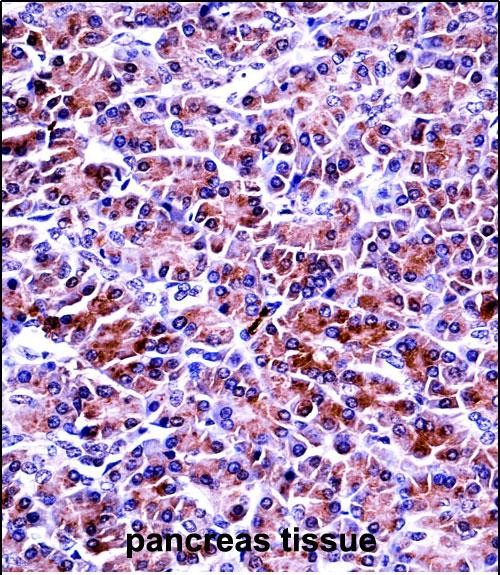PRSS2 Antibody (Center)
Affinity Purified Rabbit Polyclonal Antibody (Pab)
- SPECIFICATION
- CITATIONS
- PROTOCOLS
- BACKGROUND

Application
| IHC-P, WB, E |
|---|---|
| Primary Accession | P07478 |
| Other Accession | NP_002761.1 |
| Reactivity | Human |
| Host | Rabbit |
| Clonality | Polyclonal |
| Isotype | Rabbit IgG |
| Calculated MW | 26488 Da |
| Antigen Region | 80-108 aa |
| Gene ID | 5645 |
|---|---|
| Other Names | Trypsin-2, Anionic trypsinogen, Serine protease 2, Trypsin II, PRSS2, TRY2, TRYP2 |
| Target/Specificity | This PRSS2 antibody is generated from rabbits immunized with a KLH conjugated synthetic peptide between 80-108 amino acids from the Central region of human PRSS2. |
| Dilution | IHC-P~~1:10~50 WB~~1:1000 E~~Use at an assay dependent concentration. |
| Format | Purified polyclonal antibody supplied in PBS with 0.09% (W/V) sodium azide. This antibody is purified through a protein A column, followed by peptide affinity purification. |
| Storage | Maintain refrigerated at 2-8°C for up to 2 weeks. For long term storage store at -20°C in small aliquots to prevent freeze-thaw cycles. |
| Precautions | PRSS2 Antibody (Center) is for research use only and not for use in diagnostic or therapeutic procedures. |
| Name | PRSS2 |
|---|---|
| Synonyms | TRY2, TRYP2 |
| Function | In the ileum, may be involved in defensin processing, including DEFA5. |
| Cellular Location | Secreted, extracellular space. |
| Tissue Location | Expressed in Paneth cells, at the base of small intestinal crypts. |

Thousands of laboratories across the world have published research that depended on the performance of antibodies from Abcepta to advance their research. Check out links to articles that cite our products in major peer-reviewed journals, organized by research category.
info@abcepta.com, and receive a free "I Love Antibodies" mug.
Provided below are standard protocols that you may find useful for product applications.
Background
This gene encodes a trypsinogen, which is a member of the trypsin family of serine proteases. This enzyme is secreted by the pancreas and cleaved to its active form in the small intestine. It is active on peptide linkages involving the carboxyl group of lysine or arginine. This gene and several other trypsinogen genes are localized to the T cell receptor beta locus on chromosome 7.
References
Felderbauer, P., et al. Exp. Clin. Endocrinol. Diabetes (2010) In press :
Gao, J., et al. Oncol. Rep. 23(6):1683-1692(2010)
Cevik, Y., et al. Ulus Travma Acil Cerrahi Derg 16(2):125-129(2010)
Andersen, A.M., et al. Pancreas 39(1):26-30(2010)
Johansen, D., et al. Pancreatology 10 (2-3), 229-237 (2010) :
If you have used an Abcepta product and would like to share how it has performed, please click on the "Submit Review" button and provide the requested information. Our staff will examine and post your review and contact you if needed.
If you have any additional inquiries please email technical services at tech@abcepta.com.













 Foundational characteristics of cancer include proliferation, angiogenesis, migration, evasion of apoptosis, and cellular immortality. Find key markers for these cellular processes and antibodies to detect them.
Foundational characteristics of cancer include proliferation, angiogenesis, migration, evasion of apoptosis, and cellular immortality. Find key markers for these cellular processes and antibodies to detect them. The SUMOplot™ Analysis Program predicts and scores sumoylation sites in your protein. SUMOylation is a post-translational modification involved in various cellular processes, such as nuclear-cytosolic transport, transcriptional regulation, apoptosis, protein stability, response to stress, and progression through the cell cycle.
The SUMOplot™ Analysis Program predicts and scores sumoylation sites in your protein. SUMOylation is a post-translational modification involved in various cellular processes, such as nuclear-cytosolic transport, transcriptional regulation, apoptosis, protein stability, response to stress, and progression through the cell cycle. The Autophagy Receptor Motif Plotter predicts and scores autophagy receptor binding sites in your protein. Identifying proteins connected to this pathway is critical to understanding the role of autophagy in physiological as well as pathological processes such as development, differentiation, neurodegenerative diseases, stress, infection, and cancer.
The Autophagy Receptor Motif Plotter predicts and scores autophagy receptor binding sites in your protein. Identifying proteins connected to this pathway is critical to understanding the role of autophagy in physiological as well as pathological processes such as development, differentiation, neurodegenerative diseases, stress, infection, and cancer.



